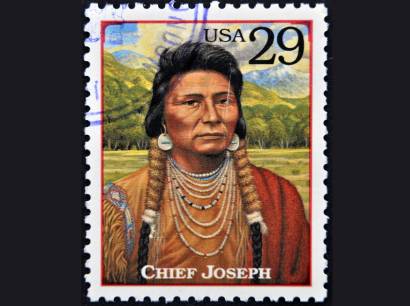This Week's Story
subscribe to podcast [click here] or play audio below
Chief Joseph courageously struggles for peace with whites and freedom for his Nez Perce people.

This Week’s Story relives American history and the Bible through brief inspiring stories presented on mp3 audio recordings and text for reading.
I will speak with a straight tongue. part one
Chief Joseph had greatness! What he said and what he did made fools of people who declared, “The only good Indian is a dead Indian.” Such fools made the mistake of thinking you fairly could call all whites prejudiced crackers and all Native Americans crude savages. Chief Joseph of the Nez Perce Indians broke the stereotypes many whites had of Native Americans.
The American frontier was often harsh. It’s true, that some settlers on the frontier were scalped, tomahawked, and kidnapped by Indian warriors. But there were also friendly tribes like the Nez Perce. They were the largest tribal people between the Missouri River and the Pacific Ocean and known for helpfulness, rather than violence. When the Lewis and Clark Expedition met the Nez Perce people, the Expedition members were starving. The Nez Perce helped them with food, horses, and canoe building.
In later years Chief Joseph continued a policy of trying to keep peace with whites. Even in the war, which was to come, he commanded his band of Nez Perce warriors, “Do not torture or scalp your enemies.”
Young Joseph’s life began in 1840 in the wide Wallowa Valley with winding rivers surrounded by snow-capped mountains. It was the ancestral homeland of a band of Nez Perce, whose chief was Young Joseph’s father, Chief Joseph the Elder. He had converted to Christianity and worked successfully to keep peace as settlers came to the valley. But as more and more streamed across the United States in hopes of land and opportunity, peace became tougher and tougher to maintain. Some settlers had straight tongues, and some had forked tongues. With phony agreements Indian land was disappearing into the hands of white settlers.
Indians were observing, “That farm is where my tepee was last winter. It’s where I hunted with my father and where I want to teach my grandson to fish.”
Too many United States government officials signed and later broke fancy treaties with Indians, in order to take their land. Chief Joseph the Elder worked courageously to find peaceful ways for his people to live on their land and not be sent to a distant reservation to live like cattle in a corral. He helped negotiate a Nez Perce reservation, which included Wallowa Valley.
Too soon the treaty he had helped form was broken. Gold was discovered on the reservation and thousands of prospectors flocked there. The U. S. government sent a company of soldiers to stop the white settlement. The soldiers failed. The government gave up, and forced a new treaty, called the Lapwai Treaty or The Thief Treaty. It was a tragic betrayal of promises. Nine-tenths of the reservation was taken away, including the beloved Wallowa Valley of Chief Joseph’s band of Nez Perce.
Old Chief Joseph and several other chiefs announced, “We will not sign it.” The old chief tore his American flag and shredded his Bible. He and some Nez Perce were allowed to live on a small strip of land in the valley.
In 1871 Chief Joseph the Elder died, and Young Joseph at age 31 was elected to be the new chief. He had been educated in his tribe and in a Christian mission. He was a skilled frontier speaker and a political leader. He was a man genuinely wanting peace for his people, but within six years he was ordered, “Move your people out of the valley. They must live on the Lapwai Reservation or your people will be at war with the United States government.”
This is Barbara Steiner. Soon we will hear of the Nez Perce's famous journey.
Find more stories from American history and the Bible at thisweeksstory.com.
<< previous story] [next story >>
We invite your comments! [click here to comment]
This Week's Story is a non-profit supported by listeners. [click here to make a donation]
